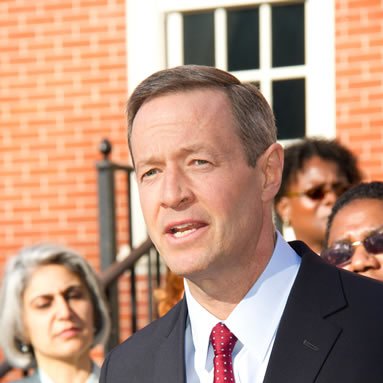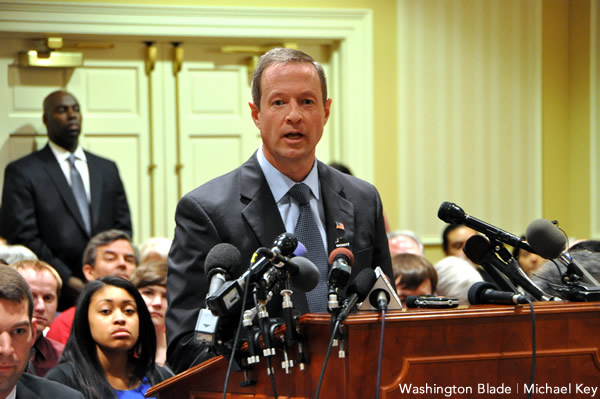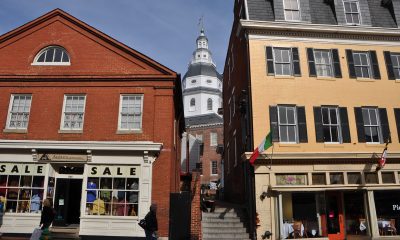Local
O’Malley: Md. marriage campaign ‘is in good shape’
Maryland governor said pro-Question 6 campaign needs to raise an additional $400,000 before Election Day


Maryland Gov. Martin O’Malley stressed the campaign defending his state’s same-sex marriage law is “in good shape.” (Washington Blade photo by Michael Key)
Maryland Gov. Martin O’Malley told journalists during an Oct. 31 conference call that the campaign defending his state’s same-sex marriage law needs to raise roughly $400,000 to ensure Question 6 passes on Election Day.
HOW DO PRESIDENT OBAMA AND GOVERNOR ROMNEY COMPARE ON LGBT ISSUES?
“We’re now about $400,000 away from having on hand what we need to have, so this last push is critically important,” he said. “We continue to raise dollars, and the interest in this question continues — more and more people are becoming interested in this, so I appreciate your coverage on it. And hopefully with your coverage of what you’re doing and what the campaign we’ll be able to get the word out and rally people to this cause.”
Marylanders for Marriage Equality’s Oct. 12 campaign finance report noted it had raised slightly under $3.3 million. O’Malley said the pro-Question 6 group has raised another $1.5 million since he spoke with LGBT bloggers and journalists during a Sept. 24 conference call. This figure includes the $1,205,392.87 that Marylanders for Marriage Equality raised between Oct. 8-21, according to its latest campaign finance report it filed with state election officials on Oct. 26.
The Maryland Marriage Alliance, which opposes Question 6, raised only $846,865.23 during the same period.
“We have one week to go,” said O’Malley. “The campaign is in good shape.”
The governor noted both the Washington Post and the Baltimore Sun have endorsed Question 6. He further referenced Baltimore Congressman Elijah Cummings who told the Washington Blade last week he plans to vote for Maryland’s same-sex marriage law.
O’Malley also pointed out Prince George’s County Executive Rushern Baker, gay former Republican National Committee Chair Ken Mehlman, New York City Mayor Michael Bloomberg and President Obama as among Question 6’s most prominent local and national supporters.
“All of that said, we still have a lot of work to do,” said the governor.
A Goucher College poll released on Oct. 29 found 55 percent of Marylanders support marriage rights for same-sex couples in the state, compared to 39 percent who oppose them. A Baltimore Sun survey conducted between Oct. 20-23 found only 46 percent of respondents would vote for the law. A Washington Post poll published on Oct. 18 noted 52 percent of Maryland voters support Question 6, compared to 42 percent who said they oppose it.
“We always expected this race to tighten up,” said Josh Levin, campaign manager for Marylanders for Marriage Equality, during the call. “What we’ve always said is that we expect this to be a very close race, which is why we’re asking so much of our volunteers and our supporters both in terms of the fundraising and the volunteering on the ground.”
N.H. MARRIAGE EQUALITY AT STAKE IN GUBERNATORIAL RACE
Marylanders for Marriage Equality, the National Association for the Advancement of Colored People and the Maryland Marriage Alliance continue to air television and radio ads for and against Question 6 in the Baltimore and D.C. media markets. Marylanders for Marriage Equality’s latest campaign finance report indicates the group spent $2,044,748 on media between Oct. 8-21, compared to slightly more than $1 million of air time the Maryland Marriage Alliance bought during the same period.
O’Malley predicted the National Organization for Marriage will come into Maryland with what he described as a “last minute infusion” of money in the campaign’s final days. The governor said the bulk of these funds will go towards anti-Question 6 television ads.
“They’re the same ads you’ve seen in other states [with same-sex marriage campaigns;] ads even some of those that ran the ads admitted were false,” said O’Malley.
O’Malley also responded to the Blade’s question about Rev. Robert Anderson of Colonial Baptist Church in Randallstown who suggested during an Oct. 19 town hall meeting at a Baltimore church that those who don’t vote against Question 6 “are approving these things that are worthy of death.” Reverend Phillip Goudeaux of Calvary Christian Center in Sacramento, Calif., described gay men as “predators” who seek to indoctrinate children during an anti-Question 6 gathering at another Baltimore church on Oct. 21 that Family Research Council President Tony Perkins, Bishop Harry Jackson of Hope Christian Church in Beltsville, Maryland Marriage Alliance Chair Derek McCoy and roughly 100 others attended.
“That sort of rhetoric is going to be rejected by the people of our state,” said O’Malley. “We are a very diverse state, ethnically and also religiously. And we’re a people who understand that we’re all in this together. And that sort of rhetoric of fear and division and vilifying people that are not like us for whatever reason is not the sort of thing that builds consensus in Maryland.”
Levin reaffirmed his belief the campaign has had what he described as “a pretty good week or two here” despite Superstorm Sandy that forced Marylanders for Marriage Equality to cancel volunteer activities on Oct. 29.
GAY DELAWARE STATE SENATE CANDIDATES POISED TO MAKE HISTORY
Campaign supporters spoke with friends and family about Question 6 during the storm after they made sure they were safe. Levin also noted the campaign saw “a lot of support” for Question 6 over the weekend at early vote locations across the state before Sandy forced officials to postpone early voting for two days.
“At this point it is sort of all hands on deck raising those last few dollars as you said and getting as many volunteers together as we can for Election Day to help us have a presence at the polls, to help us get out our voters and help us spread the word about Question 6 coming down to the very end,” he said. “The good news is that we continue to see what I think is momentum.”
O’Malley agreed.
“The bottom line is this; we’re doing well,” he said. “We need to continue to work hard. We have a real shot at prevailing here. Our message is getting through thanks to the good work and help of a lot of people. This is about fairness. This is about equality. This is about respecting the human dignity of every individual and making sure that our laws protect religious freedom while also protecting every individual equally under the law-in other words that no family’s home should receive lesser protections under the law than another family’s home.”
Maryland
Rockville teen charged with plotting school shooting after FBI finds ‘manifesto’
Alex Ye charged with threats of mass violence

BY BRETT BARROUQUERE | A Montgomery County high school student is charged with what police describe as plans to commit a school shooting.
Andrea Ye, 18, of Rockville, whose preferred name is Alex Ye, is charged with threats of mass violence. Montgomery County Police and the FBI arrested Ye Wednesday.
The rest of this article can be found on the Baltimore Banner’s website.
District of Columbia
New D.C. LGBTQ+ bar Crush set to open April 19
An ‘all-inclusive entertainment haven,’ with dance floor, roof deck

D.C.’s newest LGBTQ+ bar called Crush is scheduled to open for business at 4 p.m. on Friday, April 19, in a spacious, two-story building with a dance floor and roof deck at 2007 14th St., N.W. in one of the city’s bustling nightlife areas.
A statement released by co-owners Stephen Rutgers and Mark Rutstein earlier this year says the new bar will provide an atmosphere that blends “nostalgia with contemporary nightlife” in a building that was home to a popular music store and radio supply shop.
Rutgers said the opening comes one day after Crush received final approval of its liquor license that was transferred from the Owl Room, a bar that operated in the same building before closing Dec. 31 of last year. The official opening also comes three days after Crush hosted a pre-opening reception for family, friends, and community members on Tuesday, April 16.
Among those attending, Rutgers said, were officials with several prominent local LGBTQ organizations, including officials with the DC Center for the LGBTQ Community, which is located across the street from Crush in the city’s Reeves Center municipal building. Also attending were Japer Bowles, director of the Mayor’s Office of LGBTQ Affairs, and Salah Czapary, director of the Mayor’s Office of Nightlife and Culture.
Rutgers said Crush plans to hold a grand opening event in a few weeks after he, Rutstein and the bar’s employees become settled into their newly opened operations.
“Step into a venue where inclusivity isn’t just a promise but a vibrant reality,” a statement posted on the Crush website says. “Imagine an all-inclusive entertainment haven where diversity isn’t just celebrated, it’s embraced as the very heartbeat of our venue,” the statement says. “Welcome to a place where love knows no bounds, and the only color or preference that matters is the vibrant tapestry of humanity itself. Welcome to Crush.”
The website says Crush will be open Tuesdays and Wednesdays from 4 p.m. to 12 a.m., Thursdays from 4 p.m. to 2 a.m., Fridays from 4 p.m. to 3 a.m., Saturdays from 2 p.m. to 3 a.m., and Sundays from 2 p.m. to 12 a.m. It will be closed on Mondays.
Crush is located less than two blocks from the U Street Metro station.
District of Columbia
Reenactment of first gay rights picket at White House draws interest of tourists
LGBTQ activists carry signs from historic 1965 protest

About 30 LGBTQ activists formed a circular picket line in front of the White House Wednesday afternoon, April 17, carrying signs calling for an end to discrimination against “homosexuals” in a reenactment of the first gay rights protest at the White House that took place 59 years earlier on April 17, 1965.
Crowds of tourists looked on with interest as the activists walked back and forth in silence in front of the White House fence on Pennsylvania Avenue. Like the 1965 event, several of the men were dressed in suits and ties and the women in dresses in keeping with a 1960s era dress code policy for protests of the Mattachine Society of Washington, D.C., the city’s first gay rights group that organized the 1965 event.
Wednesday’s reenactment was organized by D.C.’s Rainbow History Project, which made it clear that the event was not intended as a protest against President Joe Biden and his administration, which the group praised as a strong supporter of LGBTQ rights.
“I think this was an amazing event,” said Vincent Slatt, the Rainbow History Project official who led efforts to put on the event. “We had twice as many that we had hoped for that came today,” he said.
“It was so great to see a reenactment and so great to see how far we’ve come,” Slatt said. “And also, the acknowledgement of what else we still need to do.”
Slatt said participants in the event who were not carrying picket signs handed out literature explaining the purpose of the event.
A flier handed out by participants noted that among the demands of the protesters at the 1965 event were to end the ban on homosexuals from working in the federal government, an end to the ban on gays serving in the military, an end to the denial of security clearances for gays, and an end of the government’s refusal to meet with the LGBTQ community.
“The other thing that I think is really, really moving is some of the gay staff inside the White House found out this was happening and came out to greet us,” Slatt said. He noted that this highlighted how much has changed since 1965, when then President Lyndon Johnson’s White House refused to respond to a letter sent to Johnson from the Mattachine Society explaining its grievances.
“So now to have gay people in the White House coming out to give us their respects and to say hello was especially meaningful to us,” Slatt said. “That was not expected today.”
Among those walking the picket line was longtime D.C. LGBTQ rights advocate Paul Kuntzler, who is the only known surviving person who was among the White House picketers at the April 1965 event. Kuntzler said he proudly carried a newly printed version of the sign at Wednesday’s reenactment event that he carried during the 1965 protest. It stated, “Fifteen Million Homosexuals Protest Federal Treatment.”
Also participating in the event was Japer Bowles, director of D.C. Mayor Muriel Bowser’s Office of LGBTQ Affairs. Bowles presented Slatt with a proclamation issued by Bowser declaring April 17, 2024, Mattachine Society Day in Washington, D.C.
“Whereas, on April 17, 1965, the Mattachine Society of Washington courageously held the nation’s inaugural picket for gay rights, a seminal moment in the ongoing struggle for LGBTQIA+ equality in the United States, marking the genesis of public demonstrations advocating for those rights and paving the way for Pride Marches and Pride celebrations worldwide,” the proclamation states.
About 30 minutes after the reenactment event began, uniformed Secret Service agents informed Slatt that due to a security issue the picketers would have to move off the sidewalk in front of the White House and resume the picketing across the street on the sidewalk in front of Lafayette Park. When asked by the Washington Blade what the security issue was about, one of the Secret Service officers said he did not have any further details other than that his superiors informed him that the White House sidewalk would have to be temporarily cleared of all people.
Participants in the event quickly resumed their picket line on the sidewalk in front of Lafayette Park for another 30 minutes or so in keeping with the 1965 picketing event, which lasted for one hour, from 4:20 p.m. to 5:20 p.m., according to Rainbow History Project’s research into the 1965 event.
Although the LGBTQ picketers continued their procession in silence, a separate protest in Lafayette Park a short distance from the LGBTQ picketers included speakers shouting through amplified speakers. The protest was against the government of Saudi Arabia and organized by a Muslim group called Al Baqee Organization.
A statement released by the Rainbow History Project says the reenactment event, among other things, was a tribute to D.C.-area lesbian rights advocate Lilli Vincenz, who participated in the 1965 White House picketing, and D.C. gay rights pioneer Frank Kameny, who founded the Mattachine Society of Washington in the early 1960s and was the lead organizer of the 1965 White House protest. Kameny died in 2011 and Vincenz died in 2023.
The picket signs carried by participants in the reenactment event, which were reproduced from the 1965 event, had these messages:
• “DISCRIMINATION Against Homosexuals is as immoral as Discrimination Against Negroes and Jews;”
• “Government Should Combat Prejudice NOT PROMOTE IT”
• “White House Refuses Replies to Our Letters, AFRAID OF US?
• “HOMOSEXUALS Died for their Country, Too”
• “First Class Citizenship for HOMOSEXUALS”
• “Sexual Preference is Irrelevant to Employment”
• “Fifteen Million U.S. Homosexuals Protest Federal Treatment”
-

 Africa4 days ago
Africa4 days agoCongolese lawmaker introduces anti-homosexuality bill
-

 District of Columbia1 day ago
District of Columbia1 day agoReenactment of first gay rights picket at White House draws interest of tourists
-

 World4 days ago
World4 days agoOut in the World: LGBTQ news from Europe and Asia
-

 Arizona1 day ago
Arizona1 day agoAriz. governor vetoes anti-transgender, Ten Commandments bill












